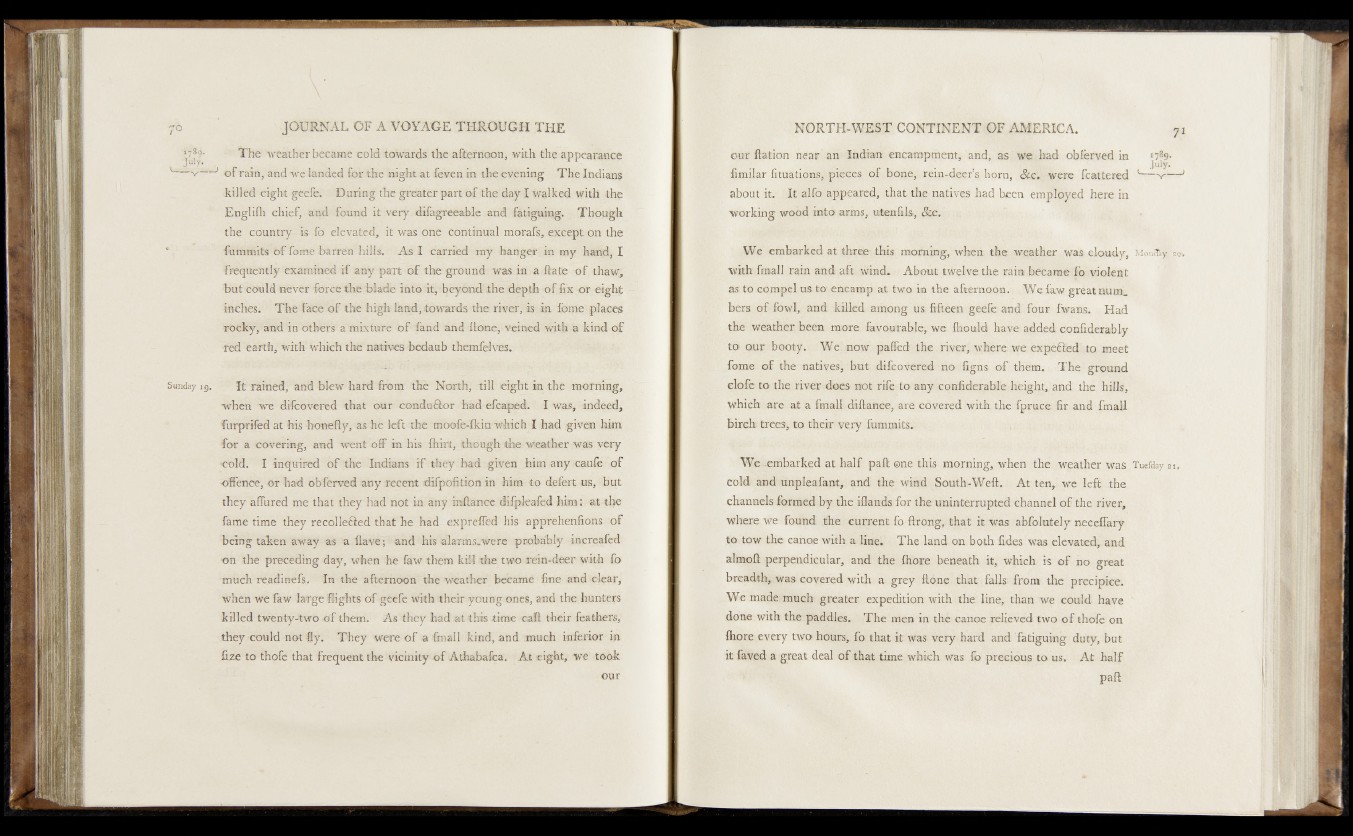
■ mg. The weather became cold towards the afternoon, with the appearance
' TBgi 'i r * ■ _ _ r r
-v—-J of rain, and we landed for the Might :at fev.cn m the evening The Indians
killed eight geéfc. During the greater part of the day I walked with the
' Englilh chief, !and found it very, difagteeahie and.-fatiguing. Though
the country is fo elevated, it was one continual morafs, except on the
fum rni i s of Come harren hills. As I carried my -hanger in my hand I
freqaentiy exaitiioed i f .any part o f the -ground .was in , a Hate of thaw,'
hut could never force tire blade into it, beyond the. depth of-fix or eight
inches. The face o f the high land, towards the. river, is in feme places
rocky, and in others a mixture of land and Hone, veined with a kind o f
red earth, with which the natives bedaub themfdves. R
Sunday 19. ' f t lamed, and blew hard fern the North, till eight in the morning,
when we discovered that our condoOsor had efcaped. I was, -indeed,
furprifed at his honefly, as he left the moofeJOkin which I had given him
for a -covering, and went o ff m his Hint, though the. weather was very
■ eoM. I inquired of the Indians if they hard given him any caufc o f
offence, or had obferved any recent dafpofition in him- to defert as, hut
they aflured me that they'had not in any iaftanoe difpleafed him: at the
fame time they recolleéted that he had exprefled his apprehenfions. of
being taken away <as -a Havé ; and his .alarms-were probably increafed
on the preceding day, when he faw them kill the two rein-deer with fo
much readinefs. In the afternoon the weather became fine and clear,
when we faw large flights of geefe with their young.ones, and the hunters
killed twenty-two -of them. As they had at this rime caH their -feathers,
they could not fiyl iThey were o f a fen all kind, and much inferior in
fize to thofe that frequent the vicinity o f Athabafca. At eight, we1 took
our
our ftafcion near an Indian- encampment, and, as ' we had obferved in J789*
Ju ly .
fimilar fituations, pieces of bone, rein-deer’s horn, Sec', were fcattered S —-v— '
about it. It alfo appeared, that the natives had been employed here in
working wood into arm?, ntenfils, Stc.
We embarked at three this morning,, when, the weather wa$ cloudy, MonA^W*
wkk final! rain and aÿrisvraiaL » About twelve the râini feéfcame fo violent
as to compel us to-eamamp at two in thé afternoon. We faw great Bum.
hers: of fowl, and kdled among u& fifte^r gedfe and four fwaffls. Had
the weather been more fevoutabley we fhould have added confiderahly
to our booty. We. now paffed the river; where we expected,’ to meet
fonxe. of the natives, but. efifeovered no figns o f them. The ground
eiofe to the river does nsot rMe; to asnyriconfiderahle height,iaftd. the hills,
which oeré: at a fkraH dâfià»ee,;are covered with the fpxuce fir and fmall
birch trees*, tso their very Fummits,.
We^embarked at half pafi one this morning, when the weather was Tuefday 21,
cold and nnpleafanit, and the wind Sonth^WeH., At fen*: we left the
channel® formed by the iflands for the uninterrupted channel o f the river,
where we found the current foflktógytbast it was abfokrfcely neceHary
to tow the canoe with aline. ^The land on- both- fides was elevated, and
alrauoH perpendicular, and the fitore beneath it, which is of no great
breadth, was covered with a grey Hone that fall® from the precipice.
We made much greater expedition with the line, than we could have '
done with the paddles. The men in thé canoe relieved two o f thofe on
Ihore every two hours, fo that it was very hard and fatiguing duty, but
it laved a great deal of that time which was fo precious to us. A t half
paft